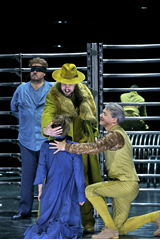| Opera Reviews | 20 April 2024 |
Katharina Wagner's psychologically intense Tristan und Isolde is compelling from beginning to endby Tony Cooper |
|
| Wagner: Tristan und Isolde Bayreuth Festival August 2015 |
|
|
Historically, this year is rather special for the opera as it marks the 150th anniversary of its première in Munich and Katharina Wagner’s production is only the 11th to be staged at Bayreuth, the famous festival founded by her great-grandfather, Richard Wagner, in 1876. And anyone thinking that the controversy surrounding her 2007 production of Die Meistersinger von Nürnberg (her first for Bayreuth) would spill over to Tristan, they were, thankfully, wrong. Widely considered to be one of the greatest works ever written to pure erotic love echoing the legendary days of King Arthur, Tristan - which Wagner rated as one of his favourites - is an emotional work to say the least. And Katharina Wagner tapped into the opera’s emotional strength to deliver a brilliant, powerful and compelling production that drifted at times from its traditional staging especially at the end. However, Katharina Wagner doesn’t seem to mind taking chances of finding new ideas in which to explore the works of her illustrious ancestor, who would, I’m sure, approve. But she treads more gently than she did with Meistersinger. The first act is highly impressive, not just musically but visually too. When we first meet Tristan and Isolde they’re already deeply in love and frantically searching for each other against all the odds with Kurwenal and Brangäne battling hard to keep them apart. When the lovers do meet it proves to be a powerful and emotive scene. They simply gaze at each other in utter silence while the love potion that Brangäne prepared is thrown away by Isolde. Their love was sealed right from the start. But what helps to make this act so impressive is Frank Philipp Schlössmann and Matthias Lippert’s brilliantly-designed set comprising a three-dimensional labyrinth of stairs evaporating into thin air, influenced by Giovanni Piranesi or M C Escher, but it was Piranesi’s engraving Il ponte levatoio: Le Carceri d’Invenzione (The drawbridge: the Imaginary Prisons) cited in the programme. However, it serves well as Tristan’s ship and gives the illusion of the ‘unattainable’ that is self-evident throughout this production. Strikingly designed costumes by Thomas Kaiser ranged from medieval to futuristic while Reinhard Traub’s moody lighting reflects the dark and brooding nature of the opera. In striking contrast to act one the second act is played out in a prison exercise yard with more than a hint of DDR political interference as Stasi-type guards (King Marke’s henchmen) look down upon the lovers forced into a small cell. They are constantly kept under tight surveillance with burning bright searchlights trained upon them. Tristan is eventually blindfolded and executed by his supposed friend, the villain Melot. In the final act, the staging is mysterious, atmospheric and cloaked in mist. And the tension is brought to breaking point as Tristan tries in vain to reach out to his beloved Isolde one last time seeing her through a series of triangular mirrors (representing, I guess, the romantic love triangle) appearing and disappearing at whim reflecting a profusion of distorted images of Isolde driving Tristan to madness and insanity. But the deeply-etched ending where a distraught Isolde shields the dead body of Tristan in her arms while King Marke offers the couple his blessing is reinterpreted by Katharina Wagner. After the singing of the Liebestod, Marke quietly drags the body of Isolde (very much alive it seems but, maybe, an apparition) across a bare stage thereby claiming his rightful bride kidnapped by his nephew. The strong, confident voice of American heldentenor Stephen Gould (Tristan) cuts through the score like a knife through butter. What a voice! But German bass, Georg Zeppenfeld, equally matches it with a commanding and confident performance as King Marke while the German dramatic soprano, Evelyn Herlitzius, cast as the Irish princess Isolde, gives an intensely moving performance with a stunning delivery of the Liebestod that more than stamped her authority on this most demanding of Wagnerian roles. Scottish bass-baritone, Iain Paterson, is excellent as Kurwenal, having also triumphed in this role in Christof Loy’s well-received Covent Garden production. Next year, he takes on Wotan at Bayreuth. Christa Mayer (Isolde’s lady-in-waiting, Brangäne) brings so much to the part while Melot is notably sung by Raimund Nolte. The orchestra plays such a dominant role, too, commenting on every psychological and dramatic development through leitmotivs and the endless melodising that Wagner substituted for arias and duets. And Christian Thielemann (recently appointed music director of Bayreuth) was on top form tackling the score with gusto and getting from his charges some rich, imaginative and exciting playing that was simply thrilling to hear in the confines of the Festspielhaus built and designed by Wagner for the sole purpose of presenting his Teutonic masterpieces. This production is a hit all round. And thinking ahead to the next Ring cycle planned for 2020, I know who I should like to see as its director!
|
|
| Text ©
Tony Cooper Photo © Bayreuther Festspiele / Enrico Nawrath |

 A new production by Katharina Wagner, Tristan und Isolde opened this year’s Bayreuth Festival in a blaze of glory with the great and the good in attendance headed by Germany's chancellor, Angela Merkel.
A new production by Katharina Wagner, Tristan und Isolde opened this year’s Bayreuth Festival in a blaze of glory with the great and the good in attendance headed by Germany's chancellor, Angela Merkel. 





